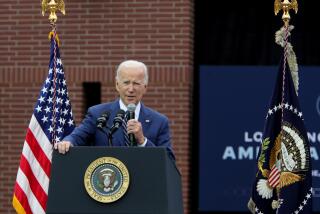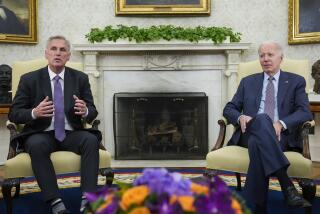Reid hopes to sway enough senators on public option
- Share via
WASHINGTON — Faced with opposition from Sens. Olympia J. Snowe (R-Maine) and Joe Lieberman (I-Conn.) over inclusion of a government-run insurance program in the Senate healthcare bill, Majority Leader Harry Reid (D-Nev.) has intensified negotiations with a handful of Democrats whose support is crucial to passing the legislation.
Reid’s announcement Monday that he would include a government insurance option in the bill, but allow states to opt out of it, thrilled liberal allies and Democrats in the House, where support for the so-called public option runs strong.
But it became immediately clear Tuesday that even the “opt out” version of the public option faced a tougher sell in the Senate.
In addition to Snowe’s and Lieberman’s opposition, many moderate Democrats refused to make a commitment.
As a result, outsized influence is falling to Democrats who are on the fence.
They are being courted with possible concessions not just in broad policies -- such as ways to reduce the impact on the budget deficit -- but in provisions affecting home-state industries.
Reid needs 60 votes to prevent Republicans from using parliamentary tactics that would keep the bill from coming to the floor -- and eventually from being brought to a final vote.
Reid needs all 58 Democrats and the two independents who caucus with the Democrats, or some Republican defectors. He is gambling that there are enough carrots and sticks lying around Capitol Hill to line up the votes he needs.
A senior Democrat said that there were about 10 Democratic senators whose support had yet to be nailed down.
Among them is Indiana Sen. Evan Bayh, who says he is worried about the bill’s fiscal impact. But Reid has made him more amenable to it by promising to modify a proposed 10-year, $40-billion excise tax on manufacturers of medical devices, a major Indiana industry.
Sen. Ben Nelson (D-Neb.), a former state insurance commissioner, is adamantly opposed to a provision that would impose new antitrust requirements on the health insurance industry, which is also one of his big campaign contributors. The Democratic leadership is exploring ways to address Nelson’s concerns.
Sen. Mary L. Landrieu (D-La.) says she is “very skeptical” of the public option, yet wants a “principled compromise” that would drive down insurance costs.
Democratic leaders may find another point of leverage far removed from the healthcare bill: Landrieu’s conservative state has been clamoring for more government aid for Hurricane Katrina damage.
Reid has been meeting one on one with balky Democrats, and at the party’s weekly closed-door strategy lunch Tuesday he pleaded for unity. But some Democrats emerged from that meeting saying they were not sure they would vote to bring the bill to the floor, let alone vote to pass it.
Reid and his lieutenants are still blending two versions of the bill, which are designed to expand access to health insurance, curb the growth of healthcare costs, and set up a new marketplace in which small businesses and people without employer-provided coverage could buy affordable policies.
There is broad Democratic consensus on those general aims, but senators are divided over liberals’ top priority: the government insurance option, which they believe will guarantee that consumers will have at least one low-cost policy.
Conservative Democrats are wary of the idea, amid fears that a government program will have an unfair advantage and undercut private insurers.
In an effort to build pressure on wavering Democrats, the U.S. Chamber of Commerce announced that it would start airing new TV ads in seven states and on national cable channels attacking the public option as a threat to employer-provided coverage.
One of the targeted states is Maine, where the chamber hopes to firm up Snowe’s opposition to the bill. Snowe voted with Democrats for the Senate Finance Committee version of the bill, which did not include a government insurance plan.
On Tuesday, Snowe said that she would not only vote against the bill if it included the public option but that she would also join fellow Republicans in trying to block the bill from coming to the floor.
“I can’t change it,” said Snowe, whom President Obama called Friday when it became clear that he was about to lose her support on the Senate bill. “But he said there are a lot of twists and turns down the road.”
Lieberman was the first non-Republican to say that he would oppose Reid’s proposal -- and even support a filibuster to block a final vote.
But Lieberman -- who owes his position as Homeland Security Committee chairman to Democratic leaders who did not demote him when he became an independent or when he campaigned for Republican John McCain over Obama in last year’s presidential election -- has said that he promised Reid he would not try to block Democrats from bringing the bill to the Senate floor.
“It’s important to start the debate,” Lieberman said.
For now, that means a lot to Reid, who had a simple message when he addressed his party caucus Tuesday: “Let’s take it one step at a time.”
--
noam.levey@latimes.com
More to Read
Get the L.A. Times Politics newsletter
Deeply reported insights into legislation, politics and policy from Sacramento, Washington and beyond. In your inbox twice per week.
You may occasionally receive promotional content from the Los Angeles Times.












